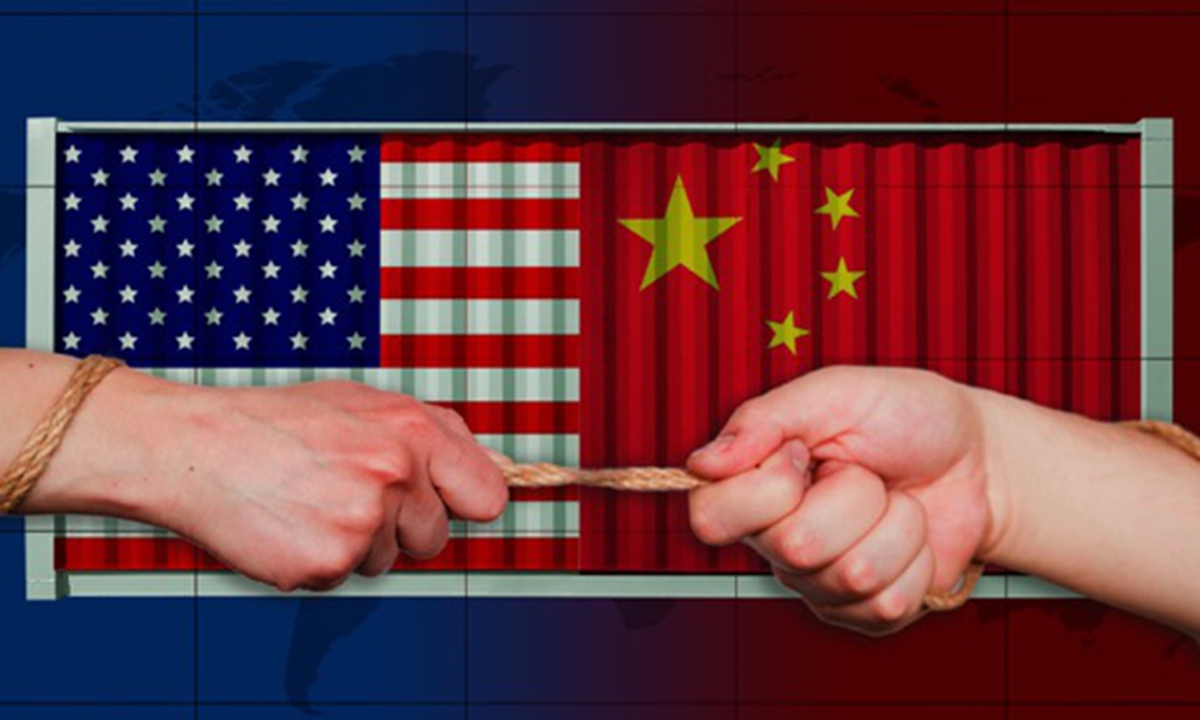China can deal with final ‘crazy’ Trump moves: Global Times editorial
Source: Global Times Published: 2020/11/13 22:18:40

China US Photo: GT
Two pieces of China-related news from the US attracted attention on Thursday. The first is that Trump signed his first executive order since the presidential election banning US investors from investing in or buying shares in 31 Chinese firms that Washington says are linked to the Chinese military. The other is US Secretary of State Mike Pompeo saying Taiwan "has not been a part of China," and that has been recognized since the Reagan administration.A serious controversy over the election results has occurred in the US, but the situation is more favorable to Joe Biden. The two above-mentioned events show that the Trump administration will go into its "final madness" against China.
Suppressing China is still a public stunt that this defeated ruling team wants to use to display its toughness until the last minute. They want to build a "political legacy" for themselves. The latest executive order will undermine US investors' interest in holding shares of Chinese companies and directly making investments through the capital market. Even if the order is abandoned after the Trump administration, it will make investors feel more risks.
On the Taiwan question, Pompeo said something that other US senior officials never said before. His remarks once again renewed speculation as to how far the US will go to jeopardize the stability of the Taiwan Straits. The one-China principle is one of the cornerstones of China-US relations. Although the US has its interpretation on one China, the People's Republic of China is the only legitimate government of China, and both sides across the Straits belong to one China, which is clearly written in the China-US joint documents. It was unimaginable in the past that a US secretary of state could say "Taiwan has not been a part of China."
Barring last-minute events, there will be not much time left for the Trump administration. As they want to disrupt and create obstacles for a Democrat-led government, they could desperately do anything. During this period, it won't be surprising for them to utter radical remarks against China, or announce extreme anti-China measures to be implemented by the next government.
The first thing that China needs to guard against is adventurous actions the Trump administration may take during the final weeks, especially military provocations and so-called diplomatic moves toward Taiwan. Once the US makes malicious provocations, China must resolutely strike back.
The Chinese people don't want to be involved in trouble after the US election. But we must make the Trump administration know that we had not hesitated to fight back their provocations during the peak of their rule, nor will we be reluctant to strike back when necessary in the coming days. Now may be their craziest time, but we know it's also their most vulnerable time. They lack mobilization abilities to promote extreme confrontation with China.
We also want to warn Taiwan authorities that they better not cooperate with Washington to take dangerous actions during the power transfer period of the US. The mainland has made preparations, including exerting stronger military pressure and carrying out punishments. Any upgrading of collusion between the US and Taiwan island will be severely punished by the mainland. The People's Liberation Army conducted intensive military exercises in the Taiwan Straits region recently. One of the purposes was to deal with challenges during the US government transition. Once the US and Taiwan island touch the bottom line, the mainland will fight a war that it is fully prepared for.
The Trump administration has greatly sabotaged China-US relations, creating a countercurrent in which the US government plays a leading role in confronting China. This definitely runs counter to the spirit of the times, contradicting the practical interests of China-US relations. There are many negative assets in the China policy legacy of the Trump administration. It's believed Pompeo and his likes must be far more worried than the Chinese people to what extent their China policy will be inherited by the new government. What they calculate are party interests and individual ambitions besides national interests, while China's countermeasures are based on safeguarding core interests of the country and seeking common interests with the US. Therefore, China is able to deal with various challenges.
Posted in: EDITORIAL